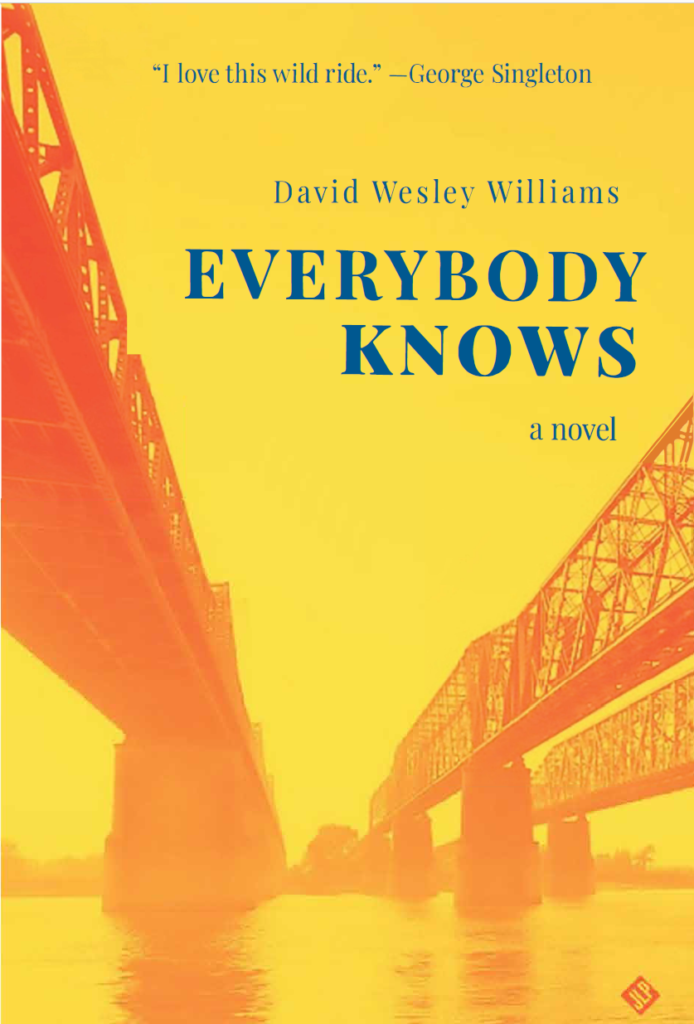Editor’s Note: This exchange is part of a series of brief interviews with emerging writers of recent or forthcoming books. If you enjoyed it, please visit other interviews in the I’ve Got Questions feature.
· What’s the title of your book? Fiction? Nonfiction? Poetry? Who is the publisher and what’s the publication date?
Everybody Knows; Fiction; JackLeg Press (Jan. 16, 2023)
· In a couple of sentences, what’s the book about?
Southern-fried and satirical, Everybody Knows tells the story of an America that’s dying, from fires, dust storms, and hurricanes, to the floods that cover most of Tennessee, where the novel is set. Major characters include an interracial couple who might be humanity’s best hope if they can survive each other, a death-row inmate mysteriously freed, and a governor fleeing Nashville for the bluff city of Memphis on a steamboat of fools, holding cabinet meetings while sitting on his version of a throne—the state’s old electric chair.
· What’s the book’s genre (for fiction and nonfiction) or primary style (for poetry)?
Literary fiction, Southern fiction, speculative fiction.
· What’s the nicest thing anyone has said about the book so far?
Could I declare a tie? Margaret Renkl said: “Come for an unforgettable cast of ne’er-do-wells, hard-luck prophets, and lovelorn writers; stay for what they tell us about who we are in this teetering moment.” And George Singleton said: “Pluck some characters out of Thomas Pynchon, Robert Penn Warren, Sonny Boy Williamson II, the Bible, and Wes Anderson movies. Place them in torrential rains and a flood. Hand them over to a genius storyteller. Mix well.”
· What book or books is yours comparable to or a cross between? [Is your book like Moby Dick or maybe it’s more like Frankenstein meets Peter Pan?]
I opened my query letters to publishers this way: “What would Kurt Vonnegut write about these times and those ahead for America, if he were alive today—and if he were Southern?” As for specific comparisons, well, my whole point is always to write a book that hasn’t already been written. Maybe that’s why I’m so lightly published! But what the heck, here goes: The Wild Palms meets A Confederacy of Dunces on the way to a John Prine concert.
· Why this book? Why now?
While satirical and (I hope) something of a hoot, this is a serious book about a country that has failed to fully reckon with its ills—and there are so many: climate change, race, public health, economic inequality, gun violence, the dark side of technology, and the politics of hate, denial, and division.
· Other than writing this book, what’s the best job you’ve ever had?
I was a newspaper reporter and editor for thirty-five years, covering everything from three Olympic Games to the aftermath of Hurricane Katrina. It was the only job I ever wanted, and it breaks my heart to see newspaper journalism in such a diminished state in the digital age.
· What do you want readers to take away from the book?
The joys of reading a novel in this short-attention-span age of reels and tweets.
· What food and/or music do you associate with the book?
This novel wouldn’t exist without the music that inspired it. The title is borrowed from a great old soul song by O.V. Wright, and the book is filled with nods and allusions to my musical heroes, from Charley Patton and Muddy Waters to Patsy Cline and Memphis Minnie. I’ve created a “soundtrack” on Spotify.
As for food, do you take your catfish fried or grilled?
· What book(s) are you reading currently?
I just finished The Village Idiot, the latest from that great author from Memphis, Steve Stern. I’ve also been reading lots of short stories, from George Singleton and Tim Gautreaux to a 1977 collection called Paddy No More: Modern Irish Short Stories. I’m looking forward to diving into my Christmas plunder: Cormac McCarthy’s The Passenger and Stella Maris; Bob Dylan’s The Philosophy of Modern Song; and Greil Marcus’s Folk Music: A Bob Dylan Biography in Seven Songs.
Learn more about David on his website.
Follow him on Instagram and Twitter.
Buy the book from Bookshop.org.


